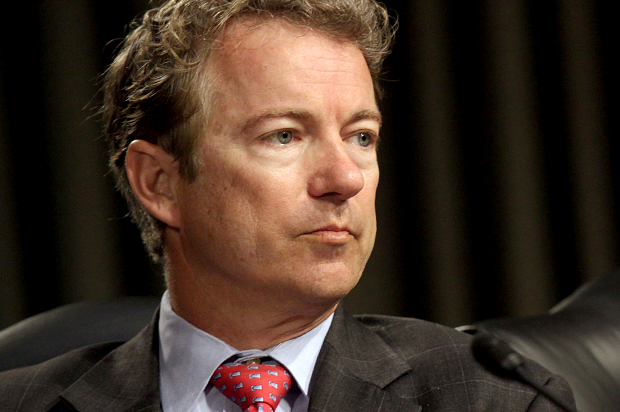Just before sundown on Monday, Politico unveiled a report on how Kentucky Sen. Rand Paul’s support for auditing the Federal Reserve has been received thus far on Wall Street. “Very poorly” seems to be the answer. According to Politico, in fact, the likely presidential candidate’s attempts to bring “the Fed” into the light may have permanently lowered the stock of “the most interesting man in politics” — at least among the conservative members of the 1 percent. “The Fed is the pre-eminent central bank on the planet,” said one anonymous Wall Street big shot, “and no one wants to put that at risk.” The party establishment, he added, would “go on red alert” if necessary to deny Paul the GOP nomination.
In one way, this was to be expected. The economic bounce-back that’s followed the Great Recession started benefitting Wall Street years before Main Street got a taste. Even now, when the working and middle classes are finally benefitting too, most of the economy’s new income is still flowing to the top. Placing the 2007-2009 hiccup aside, times on Wall Street have been rather good as of late. So the financial industry’s reticence to put its most significant institution under the microscope is easily understood. And Wall Street was never Paul’s main base of support, anyway.
In another sense, though, the Politico report is a surprise — as well as an example of why Paul’s chance at the nomination has always been overstated. Because while you’d expect the GOP’s establishment types to disdain Paul’s anti-Fed populism, you wouldn’t figure the pushback would come this early or this strong. And although you’d imagine that a pseudo-libertarian like Paul would flourish in the Tea Party-era GOP, you’d be mistaken if you saw the years spent talking about free-markets and liberty as anything more than simple branding. Each one would be a serious misstep; and it looks right now like Paul made ‘em both.
To start, let’s look at the Paul mistake that matters more to him than it does to us: timing. As noted previously, and as the Politico report makes apparent, close observers of the invisible primary for the GOP’s presidential nomination knew that it was only a matter of time until the party’s Wall Street wing tried to sink Paul. Yet most figured it would happen later, after the primary had begun in earnest and once the establishment-friendly candidates had quarreled over donors enough to wear each other down and expose one another’s weaknesses. Then Paul (or Sen. Ted Cruz or Ben Carson or some other Tea Party favorite) would swoop in and try to cobble together a winning coalition from the pieces.
But the surprisingly early and relatively frictionless launch of Bush’s de facto presidential campaign mucked that plan up for good. Except for a few days when it looked like former Massachusetts Gov. Mitt Romney would once again run for president, Bush has had an unexpectedly easy time gaining support from the kind of Republican donors who once supported Romney or might otherwise support Christie. The establishment-friendly niche in the GOP primary was supposed to be a free-for-all that left its ultimate victor wounded. Now it looks like it may be a relatively straightforward contest between Bush and Wisconsin Gov. Scott Walker instead. And that would leave to Paul the unenviable task of winning the Tea Party populists’ support rather than having it fall into his lap.
That said, the other Paul misstep is more relevant to country at large. (And it reveals another reason why Paul should regard Bush’s quick ascendance as such a threat.) From today’s vantage, it looks like Paul made a real error by taking the rhetoric of the Tea Party so seriously. As has been true with countless pundits, and a handful of recently elected GOP officeholders, Paul seems to have believed the Tea Party’s professions of libertarianism and of being more than a rebranded GOP base. At the very least, he’s seemingly bet that while same-sex marriage and reproductive rights are nonstarters, the Tea Party’s libertarianism is at least sturdy enough to act as a bridge to connect it with the hodgepodge mix of extremists who support him out of loyalty to his father.
Simply put, this gamble now looks like a mistake. If Jeb Bush was just one of many establishment-approved candidates locked in a desperate struggle to be anointed, and if the early stages of the primary concerned watching that drama reach its end, Paul’s idiosyncrasies would be a real asset. In that situation, the Tea Party candidate would be focused on taking advantage of a splintered, weakened establishment by assembling Tea Partyers and outsiders together into a winning plurality. Paul’s idiosyncratic views on foreign policy, mass surveillance and the Federal Reserve — the things that make him “interesting” to the press — would help him cast a wide net.
But if the dynamic is reversed and 2016 looks more like 2012, with a clear establishment favorite waiting to outlast a rotating cast of Tea Party-approved true conservatives, then Paul’s ideological wanderings aren’t nearly so useful. Yes, his positions may be more coherent than, say, those of Cruz or Carson; he may be less inclined than most politicians to pick and choose when to follow his first principles. But figuring out how to make that pitch while simultaneously blasting the establishment candidate as a moderate heretic will be extremely difficult, to say the least. If the Tea Party were really more than the Republican base, Paul’s libertarian-ish approach would have a real logic to it. Unfortunately for him, that’s patently not the case.

